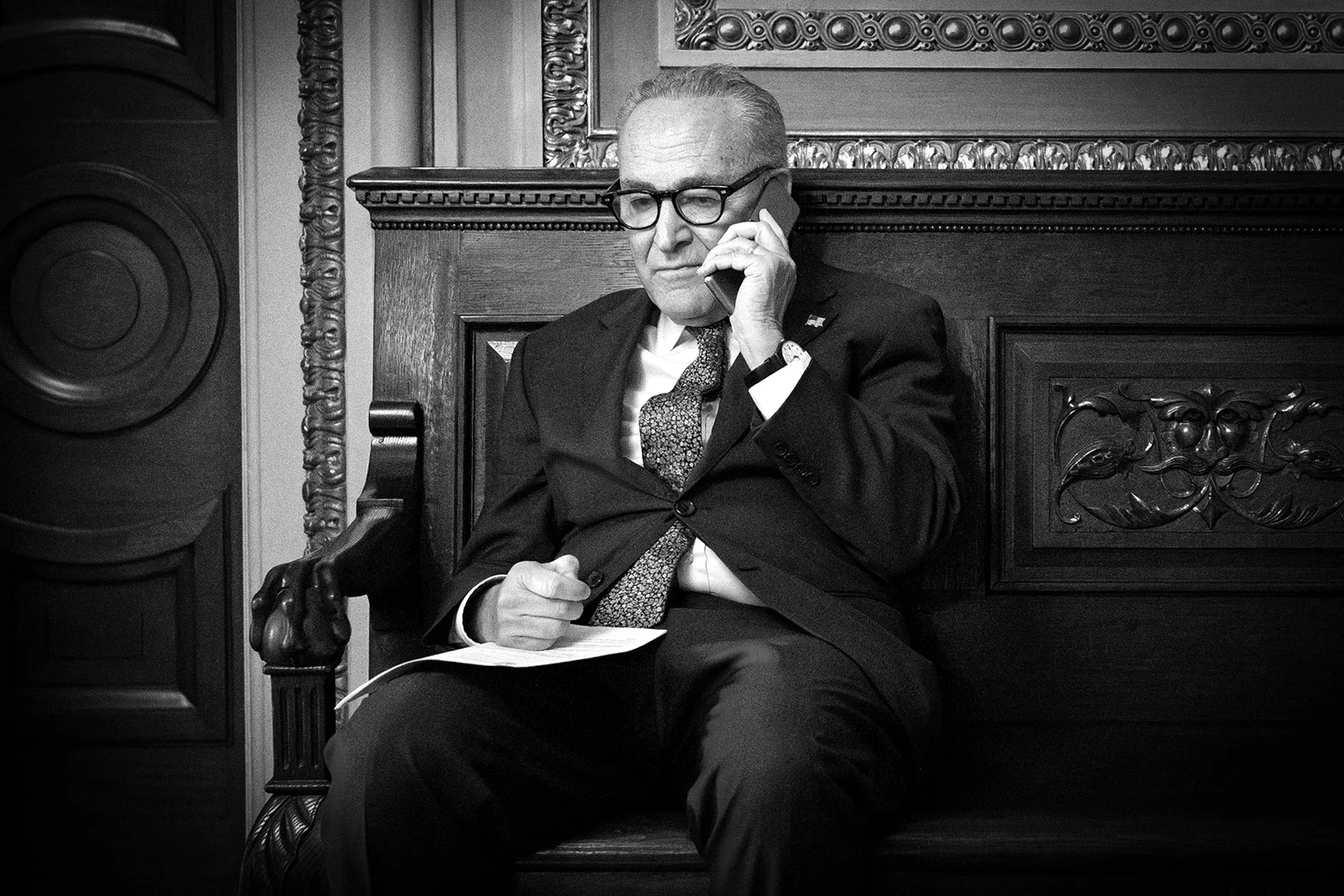Copyright Slate

Sign up for the Slatest to get the most insightful analysis, criticism, and advice out there, delivered to your inbox daily. It’s (almost) over. The House passed legislation Wednesday evening to reopen the government, and President Donald Trump says he’ll sign it. With that, the longest government shutdown in history will come to a close. And that will be because Democrats caved—again. For the past 40-plus days, the Dems and the GOP have been in a Senate stalemate, where Democrats withheld support for a government funding bill in an attempt to include expanded Obamacare subsidies that helped more Americans afford health insurance. Republicans refused and, as they lacked the 60 votes needed to pass this budget resolution on their own, the government shut down. That deadlock finally ended Sunday night, when a group of Democratic senators agreed to reopen the government without an extension of the expanded subsidies. Instead, Democrats secured the promise of a future vote on whether to revive the subsidies. The bill to reopen the government includes long-term funding for a few federal bodies (the Agriculture Department, Veterans Affairs, and Congress itself) and temporary funding for all other agencies, up until the bill’s expiration date of Jan. 30. There’s also a pledge to rehire the hundreds of thousands of federal workers laid off since Oct. 1, provide them back pay, and restrict any other layoff efforts until Jan. 30. And there’s some much weirder stuff: a measure to recriminalize any hemp products with more than 0.4 milligrams of THC, which would all but destroy a thriving industry that’s benefited farmers and small business owners; a provision allowing Republican senators to sue the government over phone records collected without their knowledge during Jack Smith’s Jan. 6 investigation; and billions of dollars afforded to Army and Navy facility upgrades. The timing of Democrats’ concession is particularly confusing, as polling showed that the public consistently blamed President Donald Trump and the GOP for the shutdown. That remained true even as the administration tried to maximize the shutdown’s pain for the public: canceling flights, laying off federal workers, and falsely claiming that it couldn’t distribute full SNAP benefits amid the shutdown. None of that, however, seemed to convince voters that Democrats were at fault. So why did eight members of the Senate Democratic caucus—Dems Catherine Cortez Masto, Dick Durbin, John Fetterman, Maggie Hassan, Tim Kaine, Jacky Rosen, Jeanne Shaheen and independent Angus King—choose this moment to fold? Lawmakers, party elders, and pundits have been furiously debating that question since Sunday night, and there’s no easy answer. But there are a few theories floating around, some more cynical or plausible than others. We’ve broken them down below. Flights, SNAP, and Fed Workers Some members of the Cave Caucus represent states that have been hit especially hard by the shutdown, one way or another. Kaine’s home state of Virginia has an especially high concentration of federal staffers who commute into D.C. and have gone weeks without pay; the commonwealth also counts nearly 900,000 SNAP recipients among its population, a fact that’s led Virginia’s Republican governor to declare a state of emergency. “The voices from the SNAP recipients, who were Virginia’s most vulnerable people, were getting louder and louder and louder as it went on,” Kaine told VPM News. The senator reportedly brokered the provision to pause federal layoffs for the bill’s duration, which he characterized as “dramatic protection for two million” federal employees “who are tired of getting kicked around.” There are similar factors in the other states represented in this delegation. About 12 percent of the population of Maine, represented by Angus King, relies on SNAP; the same goes for 15 percent of Nevadans, who are represented by Cortez Masto and Rosen, and 15 percent of Illinoisans, represented by Durbin. (Illinois junior Sen. Tammy Duckworth nevertheless voted against the bill.) King claimed in a Monday-morning Morning Joe interview that the shutdown “gave [Trump] more power, as evidenced by what he’s doing with SNAP benefits across this country.” Cortez Masto also expressed concern over Nevada’s SNAP recipients and federal workers in a conversation with NPR, as did Durbin in a public statement. More Dems Wanted to Reopen—but These Folks Took the Fall Some of the Cave Caucus members—including Cortez Masto, Fetterman, Rosen, and King—didn’t want a government shutdown to begin with, making the reopening opportunity far more palatable for them. (Fetterman’s post-vote statement read in part: “It never should have come to this. This was a failure.”) On top of that, the insider gossip from Beltway publications indicated that other Senate Democrats had been sympathetic, or at least open, to the idea of taking a deal. Georgia’s Jon Ossoff—who’s up for reelection next year in a state Trump won in 2024—faced a decent bit of pressure. Michigan’s Gary Peters, who’s retiring at the end of this term, had crafted a Schumer-endorsed counteroffer last week that Republicans soundly rejected, fueling worries that Peters was also willing to bend. Mark Kelly, the moderate senator from Arizona, wanted to work over the weekend to get a shutdown deal done, according to the Hill, and he’d been deliberating with other reportedly wavering Democratic colleagues like Wisconsin’s Tammy Baldwin, Vermont’s Peter Welch, and Michigan’s Elissa Slotkin. There are many possible reasons these lawmakers could have been eager to reopen the government: Some are on committees that give them more say over budget terms, while others hail from swing states and perhaps wished to separate themselves from partisan lines. (See also: John Fetterman.) It is particularly notable that the final dissenters have something in common: None are up for reelection in next year’s midterms, and two of them (Shaheen and Durbin) are on the verge of retirement. It’s not improbable that a larger share of Senate Democrats wished to reopen the government, and that Schumer helped arrange a lineup of lawmakers with the most plausible deniability. Not that anyone angry with the Senate considers that a sufficient explanation. Saving the Filibuster Frustrated with both the shutdown and the negative public reception of his governance, Trump had pushed on Truth Social and in private meetings for Republicans to kill the filibuster. That would have negated the need to reach a 60-vote supermajority for budgetary approvals, allowing the GOP to pass this bill with a simple majority. As angry as many Senate Democrats are with the Trump administration, its longest-serving caucus members remain committed institutionalists and would prefer to keep the filibuster. Some political analysts have made an accelerationist case for allowing Trump to nuke the filibuster once and for all, noting the tradition’s anti-democratic history and pointing out that the lawmakers have already junked the 60-vote requirements that had formerly been in place for judicial and Cabinet appointments. But, as my colleague Jim Newell has put it: “Some Democrats believe that this would redound to their benefit in the long run … I personally don’t think those Democrats have internalized how long the next three-plus years would be.” Occam’s Razor: There Was Never Any Strategy Points in favor of this argument include: the lack of unified messaging from Democrats post-passage; the fact that yet more Dems went on to co-sign the intoxicating-hemp ban after caving on health care, including every defector except for Tim Kaine; and the wishy-washy press-conference reassurances from Cortez Masto, Hassan, Rosen, and Shaheen that Republicans will hold up their end of the bargain on a health care vote. And if they don’t? “Then the American public will know where the Republicans stand,” per Cortez Masto. “The voters will know who let them down,” per Hassan. So much for that fight. The Most Depressing Possibility: They Had No Choice Some observers claim that the shutdown fight, for all its moral signposting, was always destined to fail. The Trump administration had made this a more brutal shutdown than any other in American history, illegally gutting SNAP benefits and retracting already-appropriated funds for blue states’ clean-energy and Army Corps projects. The president himself, who’d tried his damnedest to repeal and replace Obamacare during his first term, was never going to encourage Republicans to preserve the extended premiums. In a Wednesday op-ed for the New York Times, Kaine echoed this line of thinking, writing that the chances of earning “more concessions” with an extended shutdown “were near zero.” Trump “was never serious about negotiating,” the senator added. “I have close knowledge of key actors, and I do not believe Republicans would have conceded on health care during the shutdown. That was true even after their electoral wipeout last week, and even with polls showing that many Americans blamed Republicans for the shutdown. More likely, the chaos of continuing the shutdown would have led them to eliminate the Senate filibuster.” Indeed, even Democrats open to abolishing the filibuster would not have chosen to do it while they are in the legislative minority. And the nihilistic mode of governance Trump has mastered this round, doubling down on unpopular federal-troop mobilizations and unpopular tax cuts, meant he didn’t care about the Americans suffering during the shutdown. Senate Democrats had chosen this fight to show they were willing to oppose Trump. But every opposition movement has its limits.



